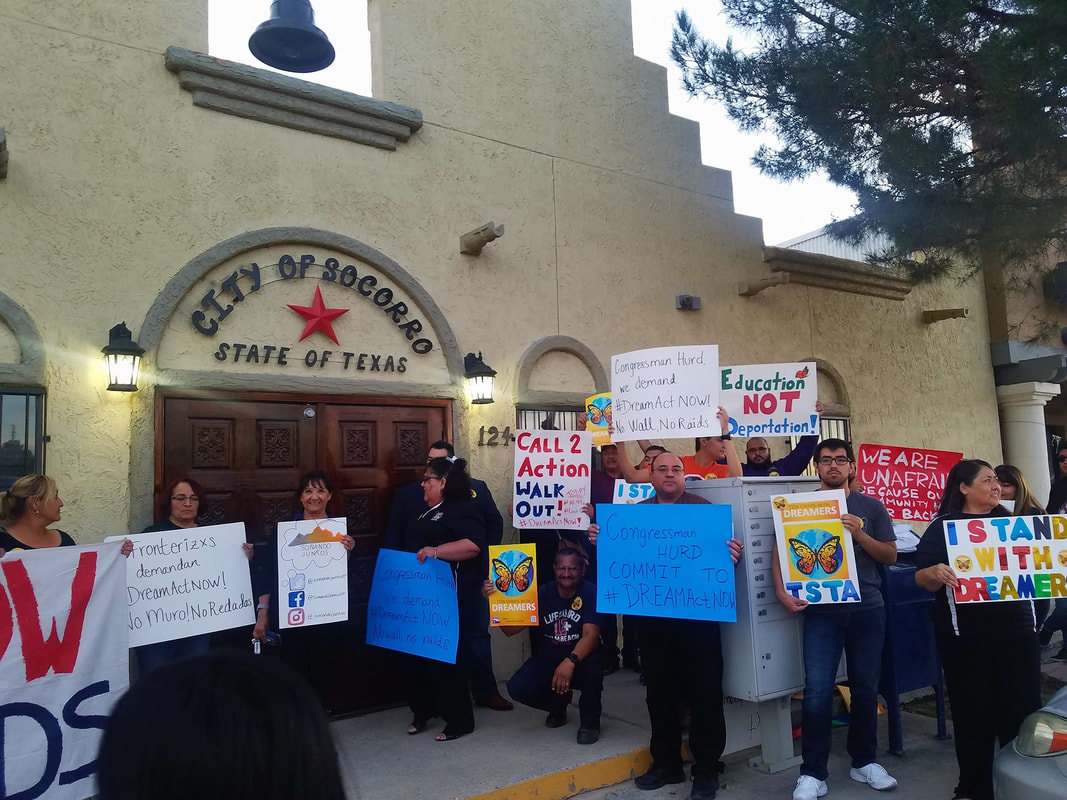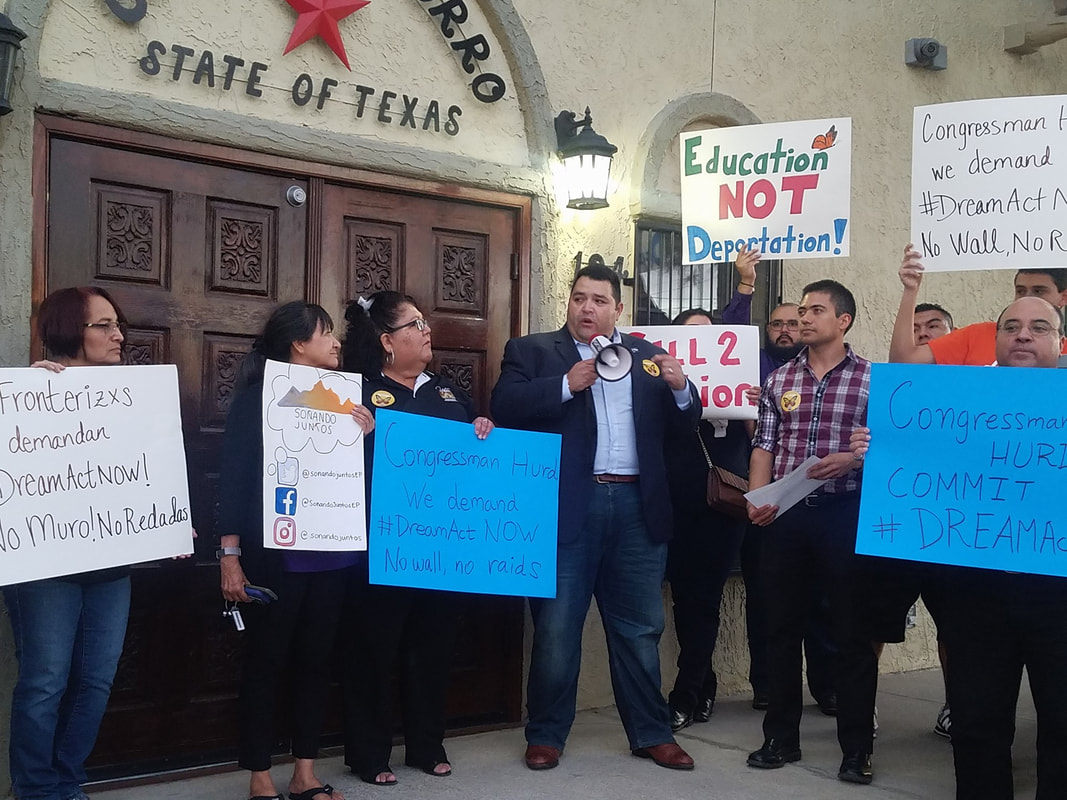This week, the State Board of Education will consider five new charter school applications recommended by Commissioner Mike Morath and the Texas Education Agency. The Texas State Teachers Association urges the board to reject all of them. “With many school districts across the state already suffering serious budgetary shortfalls following Gov. Greg Abbott’s decision to shut the door on additional state funding last year, this is no time to increase the amount of tax dollars being drained from traditional public schools by charters,” TSTA President Ovidia Molina said. “Texas public school districts already are losing more than $4 billion a year to charter schools, many of which are lower performing than the neighborhood schools they are raiding for students and tax dollars. The five charter applications that the commissioner and TEA are recommending this year are lackluster at best and offer little expectation they will improve educational opportunities for students in their proposed attendance zones.” All five applications would cut financial corners to the detriment of students. Some would decline to offer classes such as PE, foreign languages or fine arts. One says it would offer special education without planning to hire a special education teacher in its first year. Some would not offer transportation services. But all, if approved by the board, would take students and tax dollars from existing school districts. Maybe the worst application to get the commissioner’s endorsement is the proposed Unparalleled Preparatory Academy, which would try to eventually enroll as many as 1,120 students from grades 6‐12 in Manor ISD, near Austin. A key person involved in this application is a fellow of Building Excellent Schools (BES), a Massachusetts‐based organization that trains, supports and mentors charter leaders. Eleven charter schools involved with BES have been approved in Texas since 2016, and most have been plagued by poor academic performance and low enrollment. Only one has come close to meeting its enrollment projections, and, at last report, seven were underenrolled by more than 50 percent. Five of the BES‐involved charter campuses evaluated under the state accountability system in 2022 were not rated for student achievement because of low STAAR scores. Had the state not made an exception for low scores following the pandemic, each would have received an F in student achievement. One BES‐affiliated school got a C in student achievement, and the remaining campuses were not rated because they did not serve tested grades or opened later than 2022, the last year school accountability ratings have been released to the public.
|
0 Comments
The Texas State Teachers Association and its national affiliate, the National Education Association, have endorsed Democratic nominee Colin Allred over incumbent Ted Cruz in the U.S. Senate race in Texas, TSTA President Ovidia Molina and NEA President Becky Pringle announced today. “Public education is in Colin Allred’s DNA. His mother was a public school teacher who instilled in her son the importance of public schools and taught him to respect the hard work and dedication of the people who work in them. Education has been one of Allred’s top priorities during his time in Congress, and we are confident it will remain so as a senator,” Molina said. “Ted Cruz, on the other hand, has spent most of his time in the Senate trying to divide his constituents, promoting Donald Trump’s intolerant, authoritarian agenda and ignoring our public schools. The main interest Cruz has shown in public education during almost two terms in the Senate has been how to privatize it with a national program of school vouchers,” Molina added. Pringle called Allred “a proven champion for America’s students and Texas’ working families.” “Allred knows how critical it is to ensure that every student – no matter their race, place or background – has access to quality public schools,” the NEA president said. “In a time when some extreme politicians are focused on banning books and taking away learning opportunities for students, Colin Allred has partnered with parents and educators to ensure students can get the one-on-one support they need, keep students and educators safe from gun violence, expand school-based mental health programs and address educator shortages. In the Senate, Colin Allred will continue helping level the playing field for working families.” Molina praised Allred for his efforts at bipartisanship “in a Congress where that is very difficult to accomplish.” “He worked with Texas’ other senator, Republican John Cornyn, to pass the first meaningful gun safety legislation in almost 30 years. Ted Cruz voted against that bill, as he has other sensible gun safety measures. Unlike Cruz, Allred will work to keep our educators, students and their communities safe,” she said.
Notes from TSTA President, Noel Candelaria These notes from Noel Candelaria, TSTA President, have been revised for radio interviews: # HB3 will increase state funding of public education for the next two years by more than $11 billion, including $4.5 billion in additional funding for important classroom programs, about $2 billion for more teacher compensation and about $5 billion dedicated to reducing property taxes. The new law increases the basic allotment to $6,160 per student from $5,140 per student this current school year. # This is not a permanent school finance fix because much of this funding may not be available during future budget periods. This is a down payment on addressing years of legislative neglect on school finance, and the Legislature must continue its work, beginning with the next regular session in 2021. # Average per-student funding in Texas is $2,900 less than the national average, based on average daily attendance (ADA), according to the latest rankings by the National Education Association. The increased state funding will help close that gap, but Texas still will lag behind. # We are happy that the Legislature appropriated an additional $4.5 billion for classroom resources. This money will be spent on important programs, such as all-day, pre-K for low-income students; services for dyslexic students; and more programs for disadvantaged children. # Many teachers and professional staffers – counselors, librarians and school nurses – will get pay raises under this new law, especially teachers with more than five years’ experience. But TSTA is disappointed that this is not an across-the-board raise for all school employees. Instead, much discretion in how to distribute raises will be left to school boards. The average teacher pay in Texas now is about $54,100, or $7,600 less than the national average, according to the National Education Association. This law will help close the gap for some teachers, but many still will be left lagging far behind. We don’t know what the average pay raise will be, but we fear that many teachers are not going to get that $4,000 increase in their “compensation package” that Lt. Gov. Dan Patrick touted. # We also are disappointed that bus drivers, teachers’ aides, cafeteria workers and other support staff are not guaranteed raises. Districts have to spend 30 percent of the increase in their basic allotment on pay raises, but they must give priority to teachers, counselors, librarians and nurses. TSTA will advocate before school boards for raises for support staff as well because they also play important roles in creating safe and healthy learning environments for Texas’ 5.4 million school children. And they already are paid less than teachers and, like teachers, are hit hard by rising health insurance premiums, which the Legislature failed to address. Premiums will increase another 3 percent to 8 percent, depending on an employee’s plan, next year. # The Legislature added funding to stabilize the Teacher Retirement System pension fund and allow retirees a much needed 13th check of as much as $2,000. The state is picking up the extra cost now, but retiree contributions will increase beginning in 2022. # The new property tax limitations will increase future budgetary issues for many school districts. Beginning in 2021, districts will have an annual 2.5 percent cap on increases in school property tax revenue. This plus the compression of property tax rates in HB3 will hurt the ability of school districts to increase budgets as their student populations increase. It could be a major problem for fast-growing suburban districts. # The Legislature has made a down payment on school finance reform. Next session, legislators must continue the job, find a reliable source of state funding for public schools and provide more resources to close Texas’ shortfall in per-student funding and educator pay. One Step Closer to $5000 RaiseFebruary 25, 2019
Senate Finance Committee approves teacher pay raiseAfter hearing compelling testimony from TSTA member Virginia Caldwell of Hutto ISD and other teachers, the Senate Finance Committee approved Senate Bill 3, which would give all classroom teachers an across-the-board $5,000 pay raise. The measure, which now goes to the full Senate, doesn’t include librarians, counselors, nurses and school support staff, and TSTA will continue working to include a pay raise for them as well. If enacted, SB3 would help us close the $7,300 annual deficit by which the average teacher pay in Texas lags behind the national average. Caldwell, an ESL middle school teacher, told the committee that she earns more a day as an Uber driver on weekends than she does for each day of teaching, despite having eight years of experience in the classroom and a master’s degree. She is one of the 39 percent of Texas teachers who have to take extra jobs during the school year to meet their families’ budgetary needs. February 22, 2019 House Democrats call for $14.5 billion boost for educationTexas House Democrats announced Thursday a $14.5 billion plan to improve public education in Texas by paying teachers and other school staff more, bolstering school safety and offering full-day prekindergarten, among other measures. The Texas Kids First Plan will also increase per-student funding and lower the amount property-wealthy districts pay to the state to support property-poor districts. Rather than a single omnibus bill, Democrats say their platform is spread across dozens of bills that they're backing — some of which have yet to be filed. A key element of the platform would allocate $3.8 billion for teachers and support staff, including raises and increased contributions to health care costs, stabilizing the Teacher Retirement System and issuing teachers $500 stipends for classroom supplies. The Texas State Teachers Association applauded the proposal but said it would only support a permanent, across-the-board pay raise funded by the state, rather than raises based on performance. SEA joins El Paso's Women's March's March For Our Lives to defend our students against gun violence.3/14/2018 Please attend this march to show that SEA members will not tolerate gun violence in our schools. Share this flyer with others and plan on wearing your school shirts to the march. If you can't go to the march, you can help us make posters on March 19th at the SEA office. For more information, please reply to this email or call 915-849-9925.
Early voting is from February 20th-March 2nd, and it’s time for us to defend public education through the polls! Below are details on SEA’s efforts to get out the vote, SEA/TSTA/NEA’s endorsed candidates, and voting resources.
SEA Voting Event Phonebanking to get TSTA members in El Paso area to do early voting at SEA office (1510 North Zaragoza, Suite A-3, El Paso, TX 79936) on Wednesday, February 28th, from 5-8pm. Light dinner will be provided. Bring your charged cell phones (and headphones!) with you to make calls. Please RSVP to this event by Tuesday, February 27th at 5pm to provide a headcount on how much food to provide. Call lists can also be distributed to those who would like to make calls at other times but cannot make calls during the phonebanking event. Can’t help out with phonebanking at all? Sign a pledge to vote here. Endorsed Candidates The following are SEA/TSTA/NEA’s endorsed candidates:
Voting Resources
SEA collaborated with Ysleta Teachers Association and El Paso Teachers Association on Friday, November 17th to have a rally in front of Congressman Will Hurd’s Socorro district office. The rally was held to demand that Congressman Hurd co-sponsor a clean Dream Act. A clean Dream Act would provide undocumented youth with a pathway to citizenship without political add-ons including increased border militarization and immigration enforcement.
This rally is a part of NEA and TSTA’s campaign to push Congress to pass the Dream Act in response to the presidential administration’s rescission of Deferred Action for Childhood Arrivals (DACA), a program that provided undocumented youth who met specific requirements with a work permit, social security number, and protection from deportation. An estimated 800,000 undocumented youth participated in the DACA program nationwide. Of the 800,000 DACA recipients, 20,000 are educators nationwide and there are approximately 2,000 educators with DACA in Texas. SEA firmly believes that since many members of SISD are undocumented immigrants including students, family members, educators, and community members, it is of utmost importance to advocate for immigrant rights. Here is a link to news coverage of the rally. Here is a link to Facebook live video of the rally. |
AuthorWrite something about yourself. No need to be fancy, just an overview. Archives
June 2024
Categories |






 RSS Feed
RSS Feed